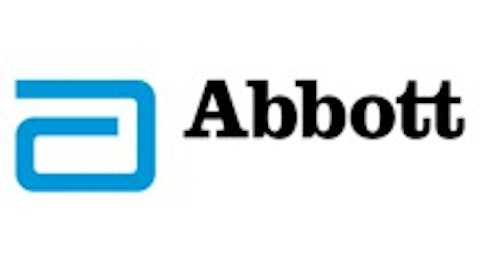Four companies
Here are the cash king margins for four industry peers over a few periods.
| Company | Cash King Margin (TTM) | 1 Year Ago | 3 Years Ago | 5 Years Ago |
|---|---|---|---|---|
| Johnson & Johnson (NYSE:JNJ) | 18.5% | 17.5% | 23% | 19.8% |
| Abbott Laboratories (NYSE:ABT) | 18.9% | 19.2% | 20.1% | 13.6% |
| Eli Lilly & Co. (NYSE:LLY) | 19.5% | 27% | 16.4% | 21.9% |
| Regeneron Pharmaceuticals Inc (NASDAQ:REGN) | (9%) | (44.6%) | (44.1%) | 7.1% |
Source: S&P Capital IQ.
Johnson & Johnson (NYSE:JNJ), Abbott Laboratories (NYSE:ABT), and Eli Lilly & Co. (NYSE:LLY) all offer comparable cash king margins that nearly double our desired 10%. However, while Abbott Laboratories (NYSE:ABT) currently has higher margins than it had five years ago, Johnson & Johnson (NYSE:JNJ) and Eli Lilly & Co. (NYSE:LLY) have both seen slight declines in their margins over the same period. Regeneron Pharmaceuticals Inc (NASDAQ:REGN) has cash king margins in the negatives, but has improved its margins significantly from last year.
Johnson & Johnson (NYSE:JNJ) made about $961 million in revenue last year on its Zytiga drug, which treats prostate cancer at a relatively low cost and in a convenient oral form. It also has promising drugs in its pipeline, including a drug designed to treat rheumatoid arthritis that it’s developing with GlaxoSmithKline plc (ADR) (NYSE:GSK). However, the company has faced some setbacks in its consumer products division, where several of its products have been recalled in the past few years, including its Adept hip implants.
After spinning off its proprietary drug business, AbbVie Inc (NYSE:ABBV), Abbott Laboratories (NYSE:ABT) lost access to the revenue generated by blockbuster drug Humira, leaving it with diagnostics, generic drugs, and nutritional products. If Abbott Laboratories (NYSE:ABT) can manage to market its products well in emerging markets like China, it may be able to achieve strong growth that makes up for slowing U.S. sales.
Eli Lilly & Co. (NYSE:LLY) is likely to face a huge hit in the upcoming years as several of its drugs lose their patents, including Cymbalta, Gemzar, Humalog, and Zyprexa. While the company may be able to recoup some of those losses if it is able to bring its cholesterol drug evacetrapib to the market, it faces serious competition from Merck & Co., Inc. (NYSE:MRK) and Amarin Corporation plc (ADR) (NASDAQ:AMRN), which already have cholesterol drugs further along in development.
In the first year after it went to market, Regeneron Pharmaceuticals Inc (NASDAQ:REGN)’s Eylea drug, which treats wet age-related macular degeneration, managed to bring in about $1 billion in revenue. Also, Regeneron Pharmaceuticals Inc (NASDAQ:REGN)stands to gain from the huge market for wet-AMD drugs outside the U.S. if its licensing partner Bayer is able to successfully launch the drug abroad. Regeneron Pharmaceuticals Inc (NASDAQ:REGN) is also partnering with Sanofi SA (ADR) (NYSE:SNY) on a number of drugs, including a colorectal cancer drug called Zaltrap and a series of antibodies targeting ailments from high cholesterol to rheumatoid arthritis.
The cash king margin can help you find highly profitable businesses, but it should only be the start of your search. The ratio does have its limits, especially for fast-growing small businesses. Many such companies reinvest all of their cash flow into growing the business, leaving them little or no free cash — but that doesn’t necessarily make them poor investments. Conversely, the formula works better for slower-growing blue chips. You’ll need to look closer to determine exactly how a company is using its cash.
Still, if you can cut through the earnings headlines to follow the cash instead, you might be on the path toward seriously great investments.
The article Is Johnson & Johnson a Cash King? originally appeared on Fool.com.
Jim Royal has no position in any stocks mentioned. The Motley Fool recommends Johnson & Johnson. The Motley Fool owns shares of Johnson & Johnson.
Copyright © 1995 – 2013 The Motley Fool, LLC. All rights reserved. The Motley Fool has a disclosure policy.

